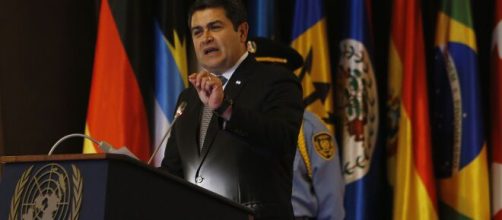Many precautions have been taken to try to protect world leaders from the COVID-19 outbreak. But like many others in the world, a number of leaders have not been immune and have fallen ill.
Those confirmed to have been diagnosed with COVID-19 include prominent politicians and other figures. Among them are three prime ministers and three high-ranking royals, including one monarch. A president hadn't yet been publicly known to have the novel Coronavirus. Until recently, that is.
Hernandez announces COVID-19 diagnosis
Juan Orlando Hernandez, the sitting president of Honduras, has said that he has contracted the novel coronavirus.
And he's not alone in his inner circle. First Lady Ana Garcia Carias also tested positive as have two members of Hernandez's staff, according to MSN.
Hernandez addressed the Central American country over television. He said that he started feeling sick during the weekend. But that so far, his symptoms have been mild. And that his wife had been, at least to that point, asymptomatic.
Despite ongoing concerns about COVID-19, Honduras recently began re-opening many businesses. This came following a three-month economic shutdown and curfew essentially. Hernandez's office said the president had maintained 'the preventative measures recommended by health authorities.' But that the nature of his position made complete isolation impossible.
His office also urged Hondurans to continue social distancing, wearing masks, and other precautionary methods.
At least one high-profile supporter has openly stated his well-wishes for the president and the first lady. That being Alejandro Giammattei, president of Honduras' western neighbor, Guatemala. He wrote that he was praying for them.
And he also expressed his 'consideration, respect, and esteem' for them.
Hernandez has been the president since 2014
Hernandez became a member of the National Congress of Honduras in 2001. He represented the Lempira Department, located in western Honduras. Hernandez had been educated in the United States and became a coffee grower.
In 2010, he became the president of the National Congress. Essentially the equivalent of the speaker of the United States House of Representatives.
In 2013, he was elected to be the next president of Honduras. Two years later, the Honduran equivalent of the Supreme Court ruled that presidents could serve multiple terms. Previously, they'd been limited to just one.
Hernandez chose to run for a second term. Other legal proceedings ensued, as questions lingered about whether or not the law permitted him to do so. He was allowed to run, despite the continuing protests from some.
He did emerge victorious in 2017, although it took a while. The results were so close that it took three weeks for a winner to be officially announced. There have also been claims of 'irregularities' in the voting process, causing some to doubt the legitimacy of the results.


